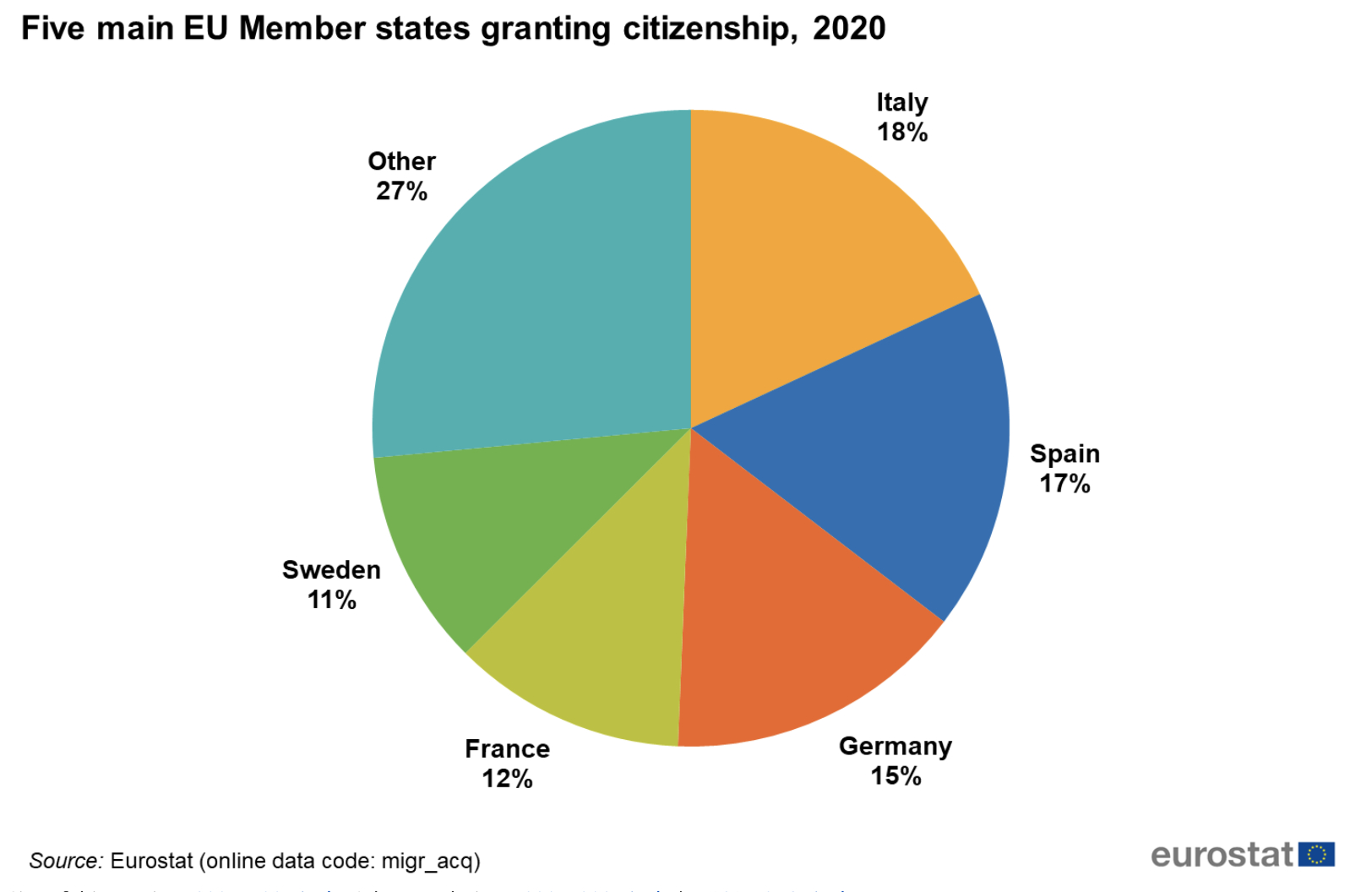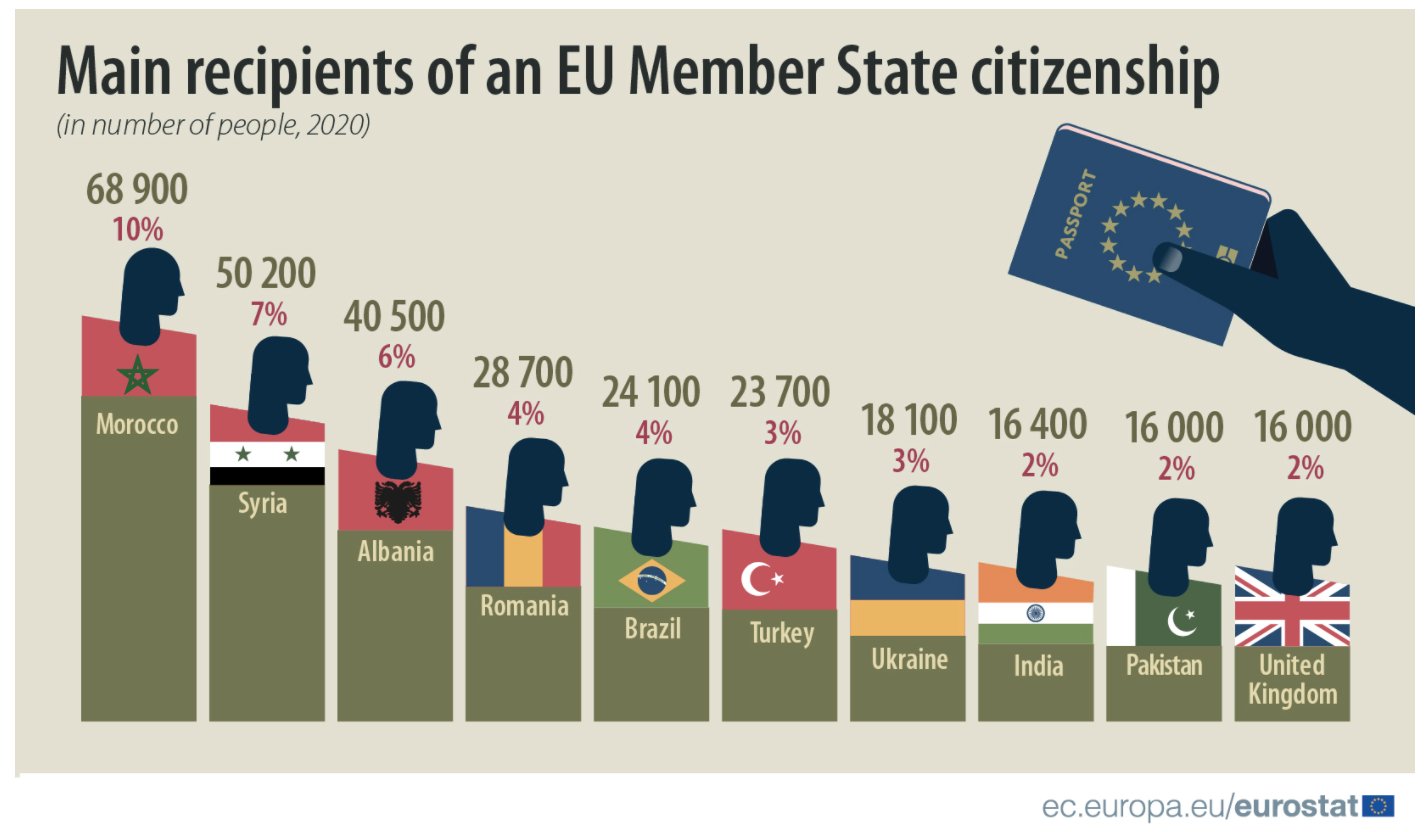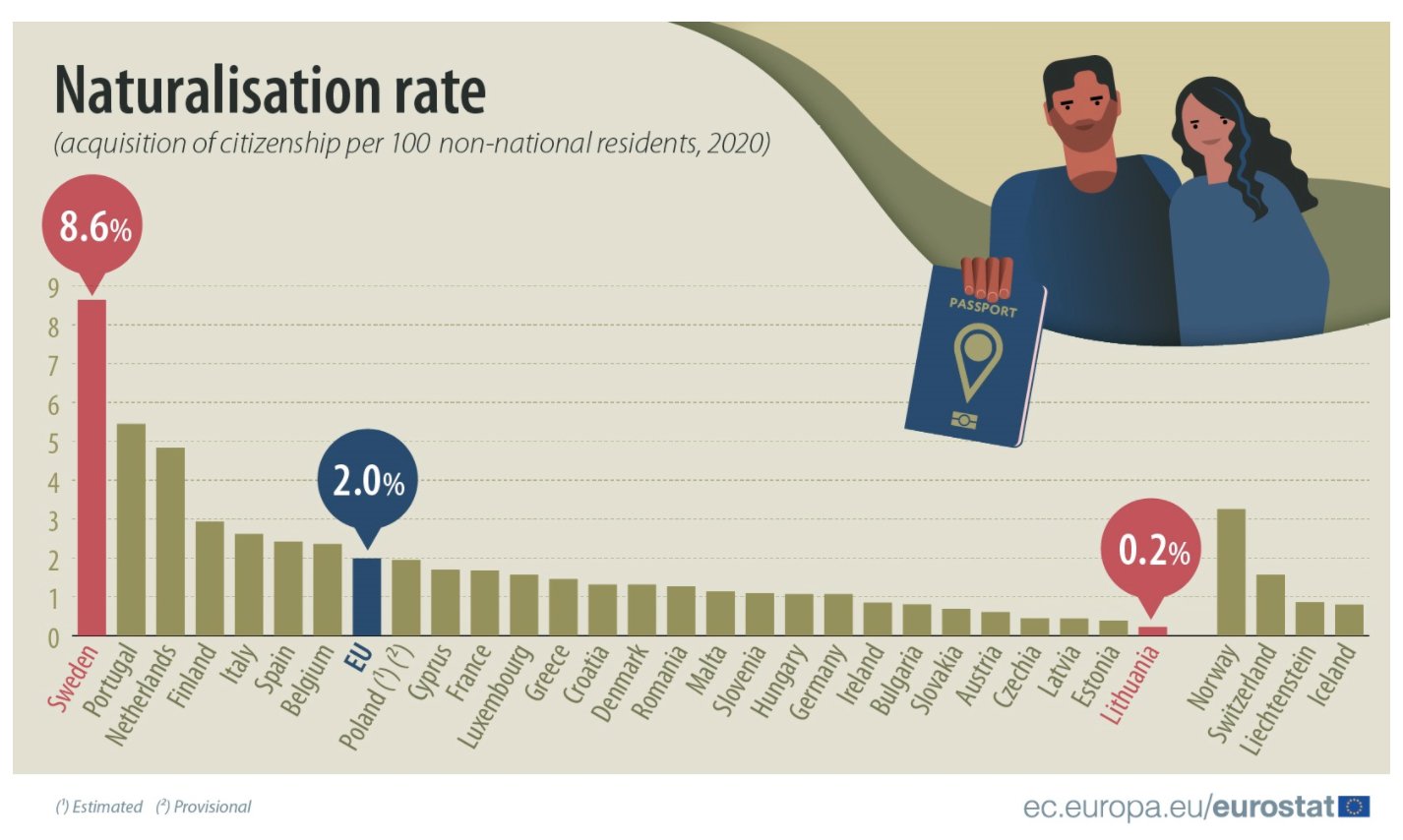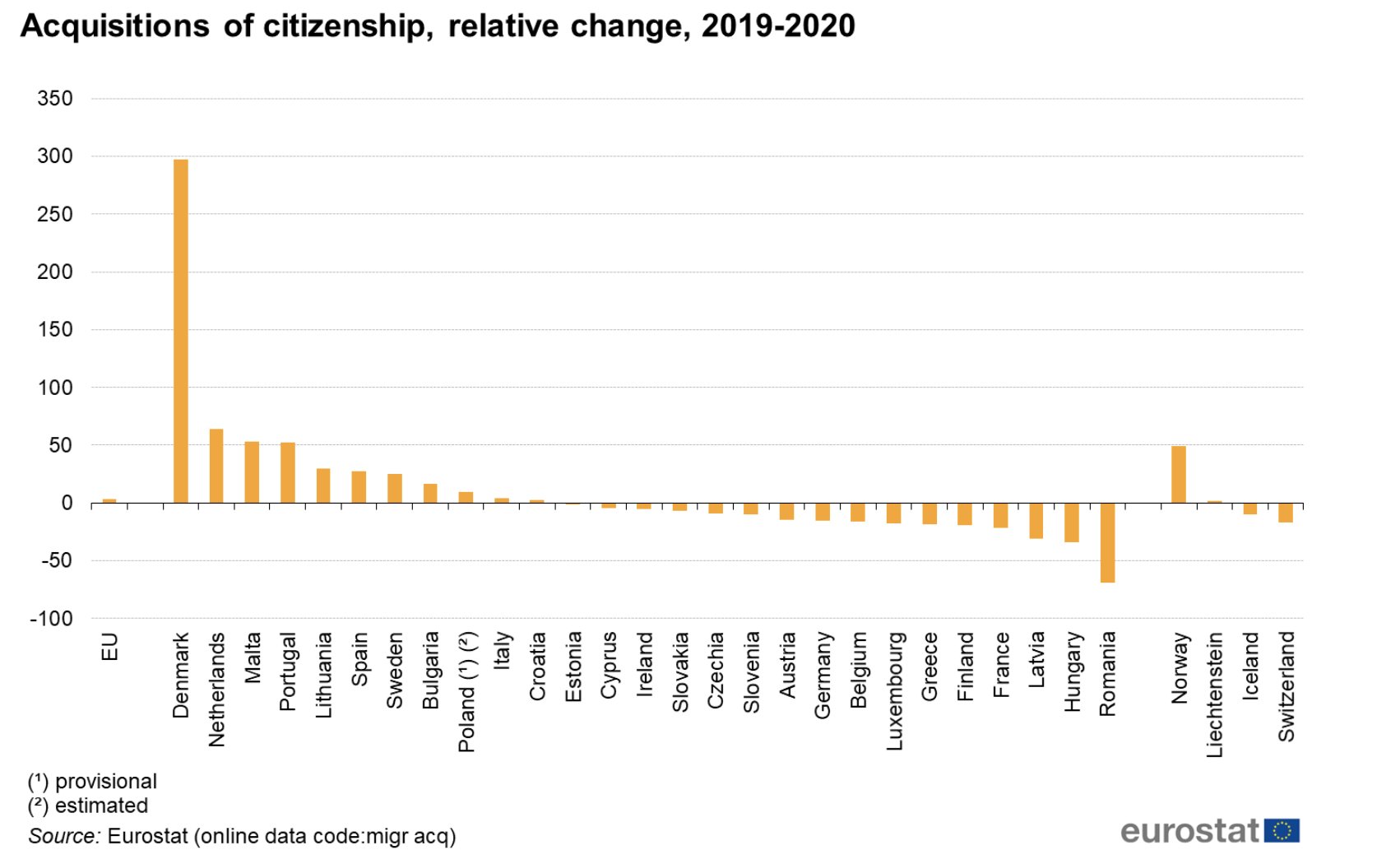COMPARE: How generous is France in granting citizenship to foreigners?

With the announcement of a new and simplified system for foreigners in France to gain French citizenship, we take a look at how generous France is in its citizenship rules compared to its EU neighbours.
Gaining French citizenship is now a (slightly) easier process, thanks to the launch of a new online portal for applications - although the process is still long, complicated and requiring a thick (virtual) file of papers.
For foreigners there are two main routes for gaining citizenship; through residency or through marriage, although it's also possible to get French nationality through family ties, through being born in France or through military service.
When it comes to nationality, France has one of the more generous systems in Europe - requiring five years of continuous residency, or two years if you completed higher education in France.
But the process itself takes on average 18 months to two years, requiring a formal language exam (at B1 level) and an interview in which candidates must display their knowledge of French history, culture and politics.
READ ALSO Am I eligible for French citizenship?
So how does France compare when it comes to granting citizenship to foreigners?
According to the latest data by the EU statistical office Eurostat, in 2020 EU member states granted citizenship to 729,000 people, an increase from 706,400 in 2019 and 607,113 ten years earlier (2011).
The vast majority, around 620,600 or 85 percent, were previously citizens of a non-EU country, while 92,200 (13 percent) were nationals of another EU member state. Only Hungary and Luxembourg granted a majority of new citizenships to other EU nationals (67 percent and 63 percent respectively). Some 7.9 percent of people acquiring citizenship in the EU in 2020 were previously stateless.
Which countries grant most new citizenships?
Five countries account for almost three quarters (74 percent) of new citizenships granted in 2020: Italy, Spain, Germany, France and Sweden.

Italy granted citizenship to 131,800 individuals, some 18 percent of the EU’s total. The Italian statistical office Istat noted that 80 percent were resident in Italy, an increase by 26% compared to 2019, while citizenships by marriage declined by 16.5 percent. The biggest proportion of ‘new citizens’ were from Albania, Morocco and Brazil, while Romanians were the largest group among EU nationals, followed by Polish and Bulgarians.
Spain granted citizenship to 126,300 people, or 17 percent of the EU’s total, an increase by 27,300 – the largest in Europe – over 2019. Romanians were again the largest group of new Spanish passport holders among other EU nationals, followed by Italians and Bulgarians. The largest groups of new citizens were from Morocco, Colombia and Ecuador.

Third in the ranking, Germany granted citizenship to 111,200 people, some 15 percent of the EU’s total, but 20,900 fewer than the previous year. The three largest groups acquiring German passport among non-EU nationals were from Turkey, Syria and Iraq. Britons were fourth.
Germany usually does not allow dual citizenship for non-EU nationals, but made an exception for British citizens until 31st December 2020, the end of the post-Brexit transition period. Although Germany's new government is to change the law to allow for dual citizenship for third-country nationals.
Romanians, Polish and Italians were the largest groups of EU citizens naturalised in Germany in 2020.
France granted 12 percent of new citizenships in the EU: 86,500 people in 2020.
In absolute terms, this was the largest decrease in the EU, with 23,300 fewer people naturalising as French than in 2019.

Among non-EU nationals, Moroccans, Algerians and Tunisians were the largest groups acquiring French citizenship. Britons were fifth. Romanians, Portuguese and Italians were the biggest groups from the EU. France, together with Germany, has a lower naturalisation rate of foreigners than the EU average (1.7 and 1.1 per 100 foreign citizens respectively compared to the EU average of 2).
With 80,200 new citizenships, or 11 percent of the EU’s total, Sweden recorded a growth of 16,000 compared to 2019 and was the country with the highest number of new citizens in relation to the total population.
Sweden is also the country with the highest naturalisation rate (8.6 per hundred foreign nationals compared to 2/100 across the EU). People from Syria, Iraq and Afghanistan were the largest groups naturalizing in Sweden among non-EU nationals, and Britons were fifth. Polish, Finnish and Romanians were the largest groups among EU citizens.
As for the other countries covered by The Local, Denmark granted citizenship to more than 7,000 people, quadrupling the number who became Danish in 2019. The largest groups of new citizens originally from outside the EU were from the UK, Pakistan and Ukraine and, within the EU, from Poland, Germany and Romania.
Austria, which allows dual citizenship in rare circumstances, recorded 9,000 new citizens, with the largest groups from Bosnia Herzegovina, Serbia and Turkey (non-EU) and Romania, Germany and Hungary (EU).

Overall, the largest groups acquitting citizenship in EU countries in 2020 were Moroccans (68,900 persons), Syrians (50,200), Albanians (40,500), Romanians (28,700) and Brazilians (24,100).
Britons were the first non-EU group acquiring citizenship in Denmark, Ireland and Luxembourg and among the top three in Cyprus and Latvia. However the number of Britons acquiring citizenship of an EU country decreased by 13,900 compared to the previous year.
Naturalisation in an EU member state automatically grants EU citizenship and therefore rights such as free movement and the ability to vote in that country as well as in local and European elections around the bloc.
In terms of gender, women were more likely than men to acquire citizenship (51 percent versus 49 percent), except for Bulgaria, Italy, Lithuania, Hungary, the Netherlands, Romania, Slovenia, Slovakia and Sweden.
The median age of persons acquiring citizenship was 33 years. 36 percent of ‘new citizens’ were younger than 25, 42 percent were aged 25 to 44, and 23 percent were children below the age of 15.
Requirements
Austria, Germany and Spain generally do not allow dual citizenship, except in some special circumstances. This means that foreign nationals who obtain the citizenship of one of these countries have to give up their nationality of origin - although Germany is in the process of changing this rule.
France and Sweden both require five consecutive years of residence in order to acquire citizenship through the residency route, but Italy, Spain, Austria and Germany all require 10 years of residence, while in Denmark people must wait for two years after acquiring their permanent residence permit, which usually takes at least eight years.
This article is published in cooperation with Europe Street News, a news outlet about citizens’ rights in the EU and the UK.
Comments
See Also
Gaining French citizenship is now a (slightly) easier process, thanks to the launch of a new online portal for applications - although the process is still long, complicated and requiring a thick (virtual) file of papers.
For foreigners there are two main routes for gaining citizenship; through residency or through marriage, although it's also possible to get French nationality through family ties, through being born in France or through military service.
When it comes to nationality, France has one of the more generous systems in Europe - requiring five years of continuous residency, or two years if you completed higher education in France.
But the process itself takes on average 18 months to two years, requiring a formal language exam (at B1 level) and an interview in which candidates must display their knowledge of French history, culture and politics.
READ ALSO Am I eligible for French citizenship?
So how does France compare when it comes to granting citizenship to foreigners?
According to the latest data by the EU statistical office Eurostat, in 2020 EU member states granted citizenship to 729,000 people, an increase from 706,400 in 2019 and 607,113 ten years earlier (2011).
The vast majority, around 620,600 or 85 percent, were previously citizens of a non-EU country, while 92,200 (13 percent) were nationals of another EU member state. Only Hungary and Luxembourg granted a majority of new citizenships to other EU nationals (67 percent and 63 percent respectively). Some 7.9 percent of people acquiring citizenship in the EU in 2020 were previously stateless.
Which countries grant most new citizenships?
Five countries account for almost three quarters (74 percent) of new citizenships granted in 2020: Italy, Spain, Germany, France and Sweden.

Italy granted citizenship to 131,800 individuals, some 18 percent of the EU’s total. The Italian statistical office Istat noted that 80 percent were resident in Italy, an increase by 26% compared to 2019, while citizenships by marriage declined by 16.5 percent. The biggest proportion of ‘new citizens’ were from Albania, Morocco and Brazil, while Romanians were the largest group among EU nationals, followed by Polish and Bulgarians.
Spain granted citizenship to 126,300 people, or 17 percent of the EU’s total, an increase by 27,300 – the largest in Europe – over 2019. Romanians were again the largest group of new Spanish passport holders among other EU nationals, followed by Italians and Bulgarians. The largest groups of new citizens were from Morocco, Colombia and Ecuador.

Third in the ranking, Germany granted citizenship to 111,200 people, some 15 percent of the EU’s total, but 20,900 fewer than the previous year. The three largest groups acquiring German passport among non-EU nationals were from Turkey, Syria and Iraq. Britons were fourth.
Germany usually does not allow dual citizenship for non-EU nationals, but made an exception for British citizens until 31st December 2020, the end of the post-Brexit transition period. Although Germany's new government is to change the law to allow for dual citizenship for third-country nationals.
Romanians, Polish and Italians were the largest groups of EU citizens naturalised in Germany in 2020.
France granted 12 percent of new citizenships in the EU: 86,500 people in 2020.
In absolute terms, this was the largest decrease in the EU, with 23,300 fewer people naturalising as French than in 2019.

Among non-EU nationals, Moroccans, Algerians and Tunisians were the largest groups acquiring French citizenship. Britons were fifth. Romanians, Portuguese and Italians were the biggest groups from the EU. France, together with Germany, has a lower naturalisation rate of foreigners than the EU average (1.7 and 1.1 per 100 foreign citizens respectively compared to the EU average of 2).
With 80,200 new citizenships, or 11 percent of the EU’s total, Sweden recorded a growth of 16,000 compared to 2019 and was the country with the highest number of new citizens in relation to the total population.
Sweden is also the country with the highest naturalisation rate (8.6 per hundred foreign nationals compared to 2/100 across the EU). People from Syria, Iraq and Afghanistan were the largest groups naturalizing in Sweden among non-EU nationals, and Britons were fifth. Polish, Finnish and Romanians were the largest groups among EU citizens.
As for the other countries covered by The Local, Denmark granted citizenship to more than 7,000 people, quadrupling the number who became Danish in 2019. The largest groups of new citizens originally from outside the EU were from the UK, Pakistan and Ukraine and, within the EU, from Poland, Germany and Romania.
Austria, which allows dual citizenship in rare circumstances, recorded 9,000 new citizens, with the largest groups from Bosnia Herzegovina, Serbia and Turkey (non-EU) and Romania, Germany and Hungary (EU).

Overall, the largest groups acquitting citizenship in EU countries in 2020 were Moroccans (68,900 persons), Syrians (50,200), Albanians (40,500), Romanians (28,700) and Brazilians (24,100).
Britons were the first non-EU group acquiring citizenship in Denmark, Ireland and Luxembourg and among the top three in Cyprus and Latvia. However the number of Britons acquiring citizenship of an EU country decreased by 13,900 compared to the previous year.
Naturalisation in an EU member state automatically grants EU citizenship and therefore rights such as free movement and the ability to vote in that country as well as in local and European elections around the bloc.
In terms of gender, women were more likely than men to acquire citizenship (51 percent versus 49 percent), except for Bulgaria, Italy, Lithuania, Hungary, the Netherlands, Romania, Slovenia, Slovakia and Sweden.
The median age of persons acquiring citizenship was 33 years. 36 percent of ‘new citizens’ were younger than 25, 42 percent were aged 25 to 44, and 23 percent were children below the age of 15.
Requirements
Austria, Germany and Spain generally do not allow dual citizenship, except in some special circumstances. This means that foreign nationals who obtain the citizenship of one of these countries have to give up their nationality of origin - although Germany is in the process of changing this rule.
France and Sweden both require five consecutive years of residence in order to acquire citizenship through the residency route, but Italy, Spain, Austria and Germany all require 10 years of residence, while in Denmark people must wait for two years after acquiring their permanent residence permit, which usually takes at least eight years.
This article is published in cooperation with Europe Street News, a news outlet about citizens’ rights in the EU and the UK.
Join the conversation in our comments section below. Share your own views and experience and if you have a question or suggestion for our journalists then email us at [email protected].
Please keep comments civil, constructive and on topic – and make sure to read our terms of use before getting involved.
Please log in here to leave a comment.